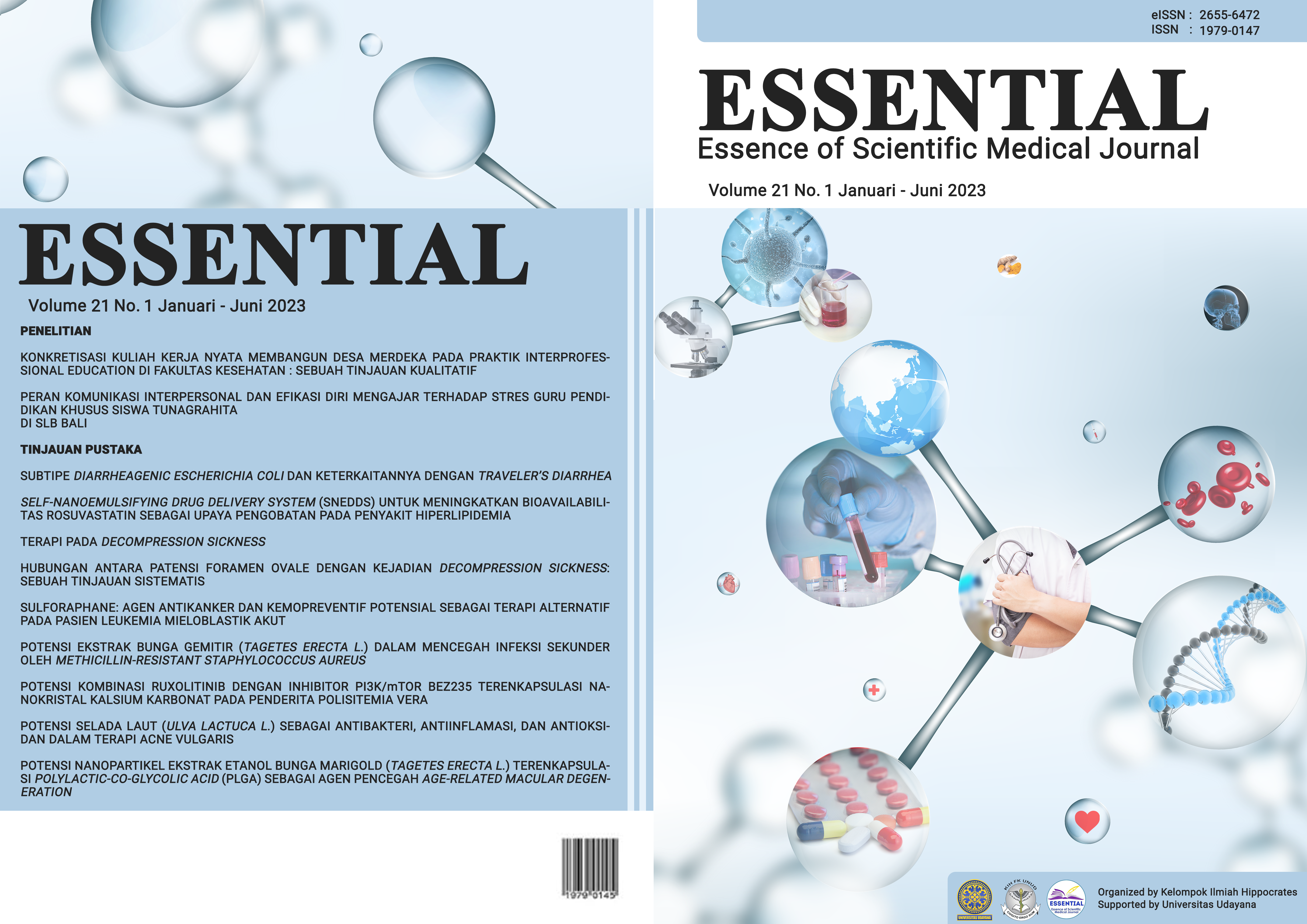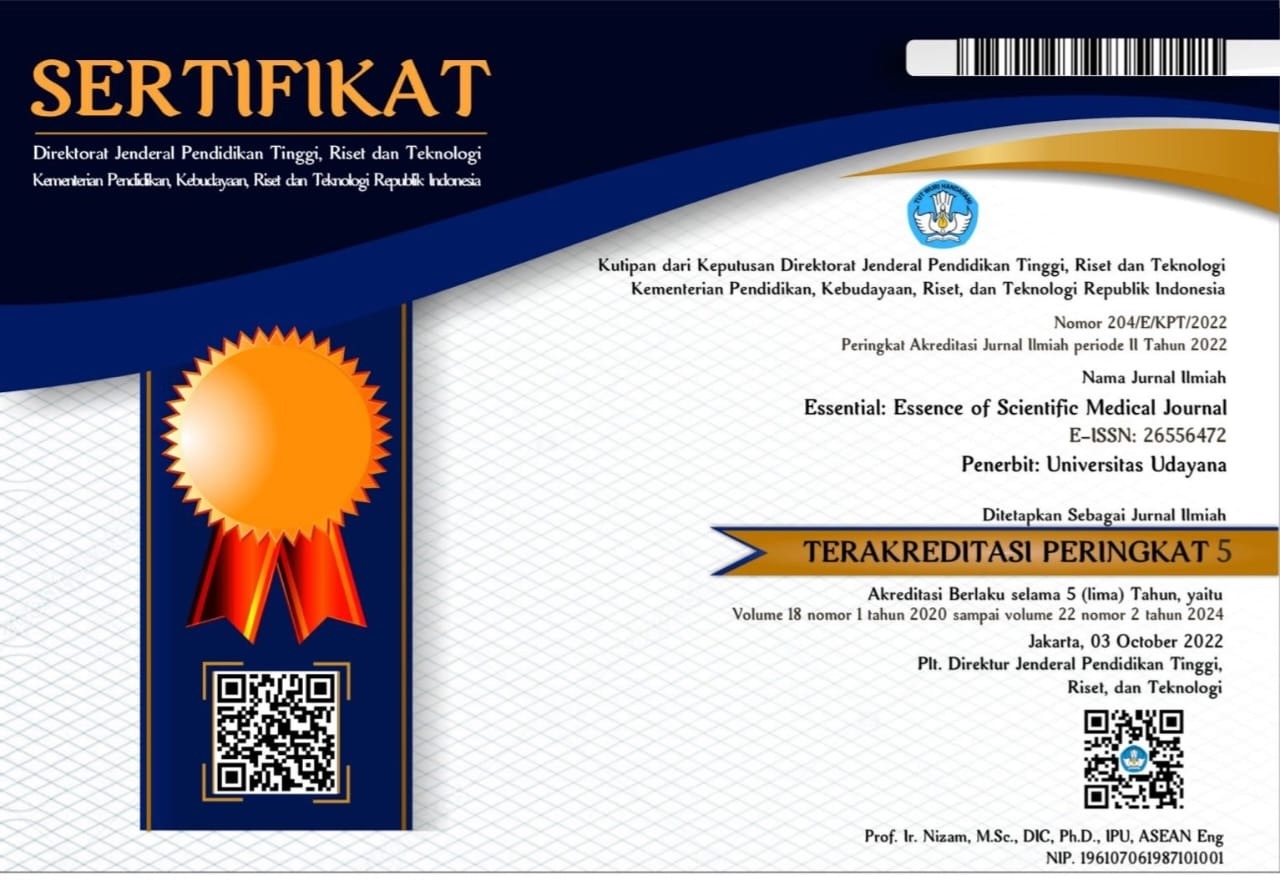Concretization of Real Work Lectures Building an Independent Village in Interprofessional Education Practices at The Faculty of Health: A Qualitative Review
Abstract
ABSTRACT
Introduction: Interprofessional Education (IPE) is a systematic pattern of adult interdisciplinary learning patterns to optimize health services. This research has a direction and aims to see the concretization of the Real Work Lecture (KKN) program to Build Independent Villages at the health faculty.
Method: This research is a qualitative research, observational descriptive type. Samples were taken using a purposive sampling method.
Result: From this research, it was found that the KKN for Developing Independent Villages has helped a lot in the practice of implementing IPE. It is evident from the results of the research that the same understanding is obtained from knowing all about adminsitration and implementation of IPE which has had an impact on the implementation of the health work program in the village environment for the implementing elements themselves.
Discussion: The IPE learning concept teaches that two or more health professions work together in optimizing health services, pursuing competency knowledge, skills, attitudes, and teamwork. This form is applied in the Community Service Program to Build an Independent Village by providing the widest possible opportunity for participants to actively participate in the health development.
Conclusion: All elements agree that this activity has a positive impact on the implementation of IPE, this program which makes the implementation of IPE successful. It is necessary in the future to make better improvements both in terms of important goals, the big picture, and even the process of realizing health in helping government performance.
Keywords: Desa Merdeka, IPE, KKN
Downloads
References
1. Guégan JF, Suzán G, Kati-Coulibaly S, Bonpamgue DN, Moatti JP. Sustainable development goal #3, “health and well-being”, and the need for more integrative thinking. Vol. 5, Veterinaria Mexico. Raymundo Martinez Pena; 2018.
2. Drynan D, Murphy S. IPE understanding and facilitating interprofessional education A Guide to Incorporating Interprofessional Experiences into the Practice Education Setting IPE Guide (2 nd edition, May 2013) Acknowledgements [Internet]. 2013. Available from: www.chd.ubc.ca
3. Anderson JG, Abrahamson K. Your Health Care May Kill You: Medical Errors. Stud Health Technol Inform. 2017;234:13–7.
4. World Health Organization (WHO). Framework for action on interprofessional education & collaborative practice. https://www.who.int/hrh/resources/framework_action/en/. 2010.
5. Erjavec K, Knavs N, Bedenčič K. Communication in interprofessional health care teams from the perspective of patients and staff. Journal of Health Sciences. 2022;12(1):29–37.
6. Elrifda S. Budaya Patient Safety dan Karakteristik Kesalahan Pelayanan: Implikasi Kebijakan di Salah Satu Rumah Sakit di Kota Jambi Patient Safety Culture and Healthcare Error Characteristics: Implication of Policy at A Hospital in Jambi. Jurnal Kesehatan Masyarakat Nasional. 2011;6(2):67–76.
7. Hapsari MK, Rivai F, Thamrin Y, Pasinringi SA, Irwandy I, Hamzah H. Analysis of the Implementation of Effective Communication on Interprofessional Collaboration in the Inpatient Installation of Hasanuddin University Hospital. Journal of Asian Multicultural Research for Medical and Health Science Study. 2022 Jan 24;3(1):23–35.
8. Vaseghi F, Yarmohammadian MH, Raeisi A. Interprofessional Collaboration Competencies in the Health System: A Systematic Review. Vol. 27, Iranian Journal of Nursing and Midwifery Research. Wolters Kluwer Medknow Publications; 2022. p. 496–504.
9. Canadian Interprofessional Health Collaborative (CIHC). Interprofessional education & core competencies. Vancouver BC V6T IZ3. 2009 Jun;1–18.
10. Darlow B, Coleman K, McKinlay E, Donovan S, Beckingsale L, Gray B, et al. The positive impact of interprofessional education: A controlled trial to evaluate a programme for health professional students Approaches to teaching and learning. BMC Med Educ. 2015 Jun 4;15(1).
11. Berger-Estilita J, Chiang H, Stricker D, Fuchs A, Greif R, McAleer S. Attitudes of medical students towards interprofessional education: A mixedmethods study. PLoS One. 2020 Oct 1;15(10 October).
12. Paterson M, Chapman C, Medves JM, Schroder C, Verma S, Broers T, et al. Action Research in Health Sciences Interprofessional Education. Journal of Social Intervention: Theory and Practice. 2008 Sep 29;17(3):7.
13. Health Professional Education Quality (HPEQ) Project. Persepsi Mahasiswa dan Dosen Pendidik Terhadap Model Pembelajaran Interprofessional Education (IPE). Jakarta: Departemen Pendidikan Tinggi Kementerian Pendidikan Nasional Republik Indonesia; 2015.
14. Pamungkasari EP, Probandari A, Boy A, Randita T, Parwatiningsih A. Perspectives Students’ and Academic Staffs’ Perspectives on an Interprofessional Education Model. Vol. 7, Jurnal Pendidikan Kedokteran Indonesia-The Indonesian Journal of Medical Education. 2018.
15. Anwas OM. Kuliah Kerja Nyata Tematik Pos Pemberdayaan Keluarga Sebagai Model Pengabdian Masyarakat Di Perguruan Tinggi. Jurnal Pendidikan dan Kebudayaan. 2011;17(5):565–75.
16. Ihsan T, Laksono HD. Panduan Kuliah Kerja Nyata Universitas Andalas. Padang: LPPM UNAND; 2019.
17. Azrimaidaliza, Djafri D. Petunjuk Teknis Pelaksanaan KKN Tematik COVID-19 “Bakti Untuk Nagari.” Padang: Fakultas Kesehatan Masyarakat Universitas Andalas; 2020.
18. Canadian Interprofessional Health Collaborative (CIHC). A National Interprofessional Competency Framework [Internet]. Canada; 2010. Available from: www.cihc.ca
19. Smego R. Interprofessional education: a concept analysis. Adv Med Educ Pract. 2010 Nov;75.
20. Devensky G. Gambaran kesiapan mahasiswa tahap akademik dan dosen orogram studi profesi dokter Fakultas kedokteran Universitas Andaas terhadap penerapan interprofessional education (IPE). [Padang]: Airlangga University Press; 2017.
21. Chandra MF, Isrona L, Taslim E, Ilmiawati I. STUDENTS PERCEPTION ON IMPLEMENTATION OF INTERPROFESSIONAL EDUCATION. Jurnal Pendidikan Kedokteran Indonesia: The Indonesian Journal of Medical Education. 2021 Jun 21;10(2):196.
22. Sunguya BF, Hinthong W, Jimba M, Yasuoka J. Interprofessional Education for Whom? — Challenges and Lessons Learned from Its Implementation in Developed Countries and Their Application to Developing Countries: A Systematic Review. PLoS One. 2014 May 8;9(5):e96724.
23. Mahmudi I. CIPP : Suatu Model Evaluasi Progam Pendidikan. Vol. 8. At Ta’dib Publisher; 2015.
24. Riyanda F. Gambaran persepsi mahasiswa tahap akademik Fakultas Kedokteran Universitas Andalas terhadap interprofessional education. [Padang]: Universitas Andalas; 2017.
25. Hakiman AP, Dewi SP, Sayusman C, Wahyudi K. Persepsi Mahasiswa Profesi Kesehatan Universitas Padjadjaran Terhadap Interprofessionalism Education. Jurnal Sistem Kesehatan. 2016 Jun 1;1(4).
26. A’la MZ, Sedyowinarso M, Harjanto T, Kristanti MS. Persepsi dan Kesiapan Mahasiswa Tahap Akademik Terhadap Interprofessional Education di Fakultas Kedokteran Universitas Gajah Mada. The Indonesian Journal of Health Science. 2012;2(2).
27. Rasmita D, Endar Timiyatun ;, Gusti I, Pramitaresti A. IPE (INTERPROFESSIONAL EDUCATION) DI STIKES SURYA GLOBAL YOGYAKARTA. Jurnal Keperawatan Priority. 2018;1(2).


 SUBMISSION
SUBMISSION
















